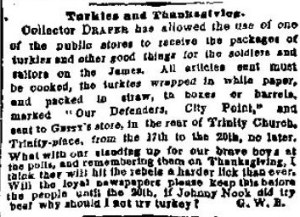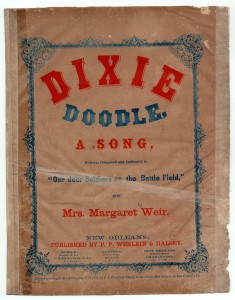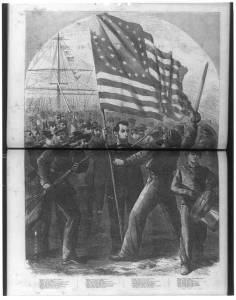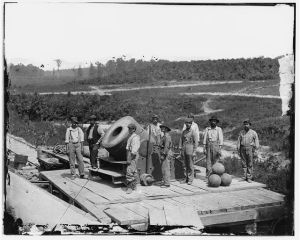Unsurprisingly, a Richmond paper was thankful the South wasn’t like Yankeedom.
From the Richmond Daily Dispatch November 10, 1864:
Thursday morning….November 10, 1864.
Lincoln’s thanksgiving day.
We observe that Lincoln, with commendable gratitude, has issued his proclamation for a day of thanksgiving among the universal Yankee nation. This is an annual custom of that people, heretofore celebrated with devout oblations to themselves of pumpkin pie and roast turkey. We have nothing to say against the custom. It is one becoming a better people, and which even they have great reasons for observing. If any body on the earth has reason to be thankful that the rain falls on the unjust as well as the just, it is the Yankee.
At this time they have special grounds for thanksgiving. The formula of the Pharisee, always adapted to their national self-esteem, has been demonstrated in this war after a fashion which must carry conviction to the most incredulous. It is a formula, more-over, in which even those can join who have not the privilege of being Yankees. “I thank thee that I am not as other men.” The Yankee may say that with a grateful heart, and other men can never be thankful enough that it is literally true. So let us all have a day of thanksgiving, and the national airs of Yankee Doodle and Dixie for once be blended in honor of the same delightful beatitude.
That the Yankee is not as other men, he proved by drawing the sword upon the old customers whose trade had made him rich, and laboring with all his might and main to cut open the goose that laid him the golden egg. What “other men” would have hit upon so ingenious an expedient for improving their condition. In 1860, their nation was free from debt. The interest upon their debt in 1861 is over eighty-one millions of dollars, which is about five millions more than the whole revenue of the United States the year before they went to war. By the 1st of May next, their national debt will amount to $2,500,000,000, and an interest of $113,000,000. This is something to be thankful for, if they mean to pay it.–In 1860, a million or more of Yankees were alive and eating thanksgiving turkey and pumpkin pie who will not be crowding the tables at the thanksgiving of 1864. The Yankee who does not rejoice that these fellows are out of the way, and that he is eating their share as well as his own, must be lost to all the finer feelings of his race.
It is much to be thankful for that they have such a President as Lincoln. What other men on the habitable globe would have chosen an ignorant and vulgar backwoods pettifogger for their Chief Magistrate; or, having incurred the loss of the richest portion of their territory, more than a million of men, and two billions of money, in penalty of their folly, would have worked for his re-election with every energy of soul and body? What other men would expect anything else from another four years experiment but a double amount of debt and dead men? What other men would find occasion for thanksgiving in such a past and such a future? But the Yankee knows what he is about. The money of the Government goes into his own pocket; and the fewer to eat, the more to be eaten. So he sends up his praises for Abraham Lincoln, that dispenser of fat contracts and thinner out of crowded populations.
What “other men” would have carried on a war in the spirit and manner in which the pious and exemplary Sons of the Pilgrims have conducted this contest? Thousands of dwelling-houses burned and their once happy and unoffending inmates turned out to face, as best they may, cold and starvation; ten thousand barns and mills, with all their contents, given to the flames; whole cities depopulated; other cities made the target of a storm of bomb-shells, bursting among helpless, shrieking women and children; vast and once lovely regions of country laid black and bare by the fiery besom of desolation! Surely no “other men” but Yankees could perpetrate, in the eves of the world, deeds like these; and no other men, in any age, would thank the God of Christianity for the achievements of devils. Let us rejoice with the Yankee that “he is not as other men.” Better to be the victim than the perpetrator of crimes against God and Humanity.
[one day a young Napoleon showed off his artillery for some ladies who were visiting; the return fire caused needless casualties]
While the pickets are perfectly quiet on both sides, and there is no sign of hostility on either, General Grant habitually fires shotted salutes along his whole thirty-odd miles in extent, whenever Stanton telegraphs a lie to him with regard to victories in the Valley or in Georgia. The city of Petersburg is, in part, commanded by these guns, and the shot from them must necessarily fall in the midst of its population. It must be a miracle, if life, to some extent, be not lost by every one of these shotted salutes. They do no good, they advance no interest, they are not expected to further the operations of the slege in the slightest degree. If the design be to encourage the troops by a loud noise and an imposing demonstration, it would have the same effect to fire the guns without shot as with them. The presumption is, therefore, that they are loaded with shot for the purpose of killing somebody; in other words, of perpetrating a cold-blooded murder, or, it may be, a dozen such, without expecting the slightest advantage from it. The friends of humanity in every part of the world except Christendom must regard such a deed with horror, and its perpetrator as an assassin.
In Yankeedom, however, it is looked upon in a far different light. Not one voice has been raised against the inhuman barbarity. Even in their rejoicing, these people are not satisfied without committing murder. There is novelty in the idea of firing a salute with shotted guns, and that is sufficient. Inhuman, barbarous, cold-blooded as it is, it is extolled as the noblest of modern inventions. Grant, of course, expresses no contrition, nor is it to be supposed that he feels any.
What would Scott and Alison, who have condemned Napoleon so severely for this one youthful error, say of Grant, who is already past the maturity of manhood! What will his future biographers say, if they should happen not to be Yankees! for Yankees think it all very pretty. They can make but one apology for him, and that is the best his case admits of. He is known to drink hard, and these salutes may have been the fire-works of a drunken frolic.




